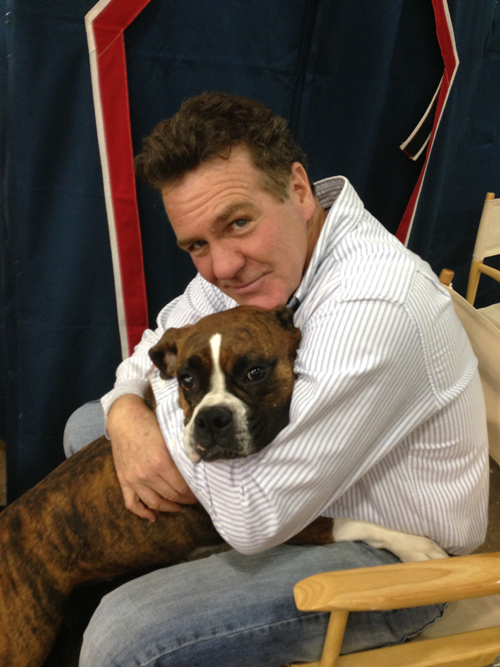
“You have to make a decision: motocross or horses.”
Ten-year-old Milo Jones had just asked for a new bike, and his mother’s reply made it clear that the bike would come at a cost. As much as he enjoyed motocross, it was not a cost he was willing to pay.
“Then I guess I’m doing horses,” he said, and that was that.
Though a career in horses might have seemed the obvious course for a child as smitten with them as Milo, his path to becoming one of the industry’s leading professionals was far from direct. Yet, with every road he started down, there was something that kept guiding him back. It took him a few years and many travels to realize that thing was true passion.
Milo grew up in Colorado in a family of equestrians, so horses were part of his life from the start. He began accompanying his mother on trail rides at the age of three, and soon started lessons at a local hunter/jumper barn. When he was six years old, his mother took him to visit a barn she had seen advertised in a brochure. That barn turned out to be Martin Cockriel Stables.
Trainer Martin put Milo aboard a nineteen-year-old Saddlebred, and allowed the young boy to ride the horse by himself in a full bridle. Milo was sold, and still remembers the feel of that mare today.
“I never wanted to ride anything else,” Milo said. “There’s no comparison.”
Martin referred Milo to a man named Les Pedicord who also had Saddlebreds in Colorado, and Milo learned the basics of saddle seat under his strict eye.
“He was very ‘old school,’ and he took his time with me,” Milo said.
He rode with him for a number of years before returning to Martin’s tutelage.
After high school Milo attended Northeastern College in Colorado, studying marine biology, but moved to Kentucky upon graduation to train horses – something he had considered all his life. He leased stalls at various barns and worked for himself, training such nice horses as Be Happy, Harlem’s Valentino and Christmas In New York and sleeping in the laundry room of legendary Saddlebred trainer Don Harris for about three months.
If you ask him about it today, he’ll shrug.
“You have to pay your dues to get where you want to go,” he’ll say.
However, at the time, Milo wasn’t entirely sure where he wanted to go. It was difficult to know if his love of horses meant he should build his career around them, and he was in the unique position of having multiple talents to pursue. One of these other talents was acting, and he soon decided to move to California and give himself a shot as an actor.
Milo had done a lot of acting throughout his youth; he enjoyed it, he was good at it, and he might have made it in California but for one thing – he missed the horses.
“In this business you’re always doing something, you’re always learning something, and there’s always a challenge,” Milo said of the horse industry.
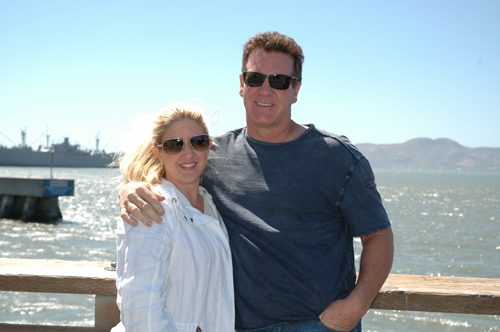
It wasn’t long before he decided to come home.
Back in Colorado, Milo started training for his parents, painting houses to make ends meet and writing plays for theatre.
“I couldn’t write them fast enough,” Milo said. “Sometimes people still contact me to ask me to write plays.”
As much as he wanted to stay in his beloved Colorado, Milo realized quickly that it wasn’t going to get him where he wanted to go in the Saddlebred industry. In 2000 he moved to Texas for a training job, and that is when Koren Mercer came into his life. The pair met at the annual Milligan Fish Fry that was held before the Big D Charity Horse Show; they hit it off immediately and began dating just a few short months later.
“I loved that he could always make me laugh - and that he has a real soft spot for all animals,” Koren said. “He was very independent and self-sufficient, like me. I was especially taken with his gentle command of, and mutual respect for, the horses.”
Over the next few years Milo and Koren moved around the country, training for clients in Oklahoma and Florida, but in 2004 they moved back to Koren’s home state of Texas and had a very successful season training at Sherry Frankel’s SGF Winning Ways Farm before taking a leap of faith and opening Lone Star Saddlebreds. Finally, Milo had found his place.
Though it took a lot of work to get Lone Star off the ground, the area was actually very receptive to the horses.
“We’ve always had a really good-sized lesson program,” Milo said. “People in Texas like this kind of a sport. It wasn’t hard to get people drawn into the Saddle Horse industry.”
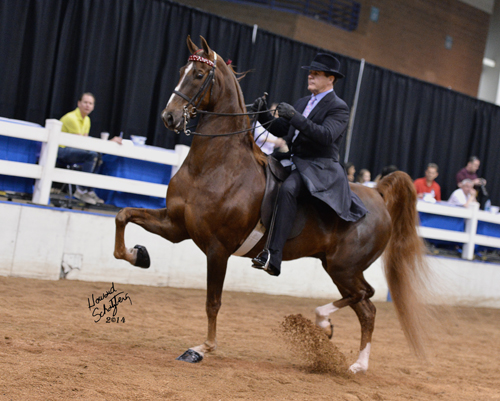
Within six months Milo and Koren had ten horses in training – not clients who had moved from other barns, but ones they had developed themselves from the earliest stages. And that was only the beginning. Today Lone Star’s numbers have doubled, with twenty client horses in training, and a large lesson program that gives anywhere from eighty to a hundred lessons a week. As of March, Milo and Koren were able to officially purchase the farm.
Though Lone Star has been home to World’s Champions such as CH The Mighty Mouse, CH Cloverleaf Master And Commander, CH Late Last Night, CH De La Hoya, Master And Commander, Boogity Boogity and Callaway’s Lil Abner, Milo believes what defines it as a barn is the passion that led him there. To Milo, it’s about far more than winning.
“The wannabes fall to the side,” he said. “They don’t last anymore. It doesn’t matter if you’re buying a $5,000 horse, a $500,000 horse or a million-dollar horse; it’s not about the money you have. It’s about how much you’re willing to put into it to make it work. That’s what we expect from people.”
Though he took a few detours on his way to opening Lone Star, Milo has no regrets. In fact, he believes that the other endeavors – particularly the acting – have helped him as a trainer.
Lone Star’s instructor, Sharon Moritz, agrees. She met Milo while visiting Texas for work, and moved her horse to him when she relocated there permanently nine years ago. In 2012 she became the barn’s instructor, and still keeps three horses in training at Lone Star.
“He’s got a gift with horses, and I don’t say that lightly,” Sharon said. “A lot of people call themselves horse trainers, but very, very few are truly gifted with them. I think that was probably there from the time he was born, and all that other stuff made him the person he needed to be to train in the way he trains and be as successful at it as he is.”
His experiences have also given him the knowledge that he can support himself in other ways if training professionally ever becomes an impossibility.
“He doesn't feel ‘trapped’ in this career choice,” Koren said. “Knowing that he has the freedom to choose makes all the difference in the world in the way he approaches each day.”
And the way Milo approaches each day is with enthusiasm. His positive attitude allows him to see even the things other trainers view as negative in a positive light. Even when it seems he is about to dole out the same tired advice that has been rehashed ruefully by jaded trainers everywhere, he does so for an entirely different reason.
“Any trainer who is wanting to do this should take a psychology class,” he said. “And I don’t say that because people are crazy, but because you need to learn to deal with the emotions of a person falling in love with an animal.”
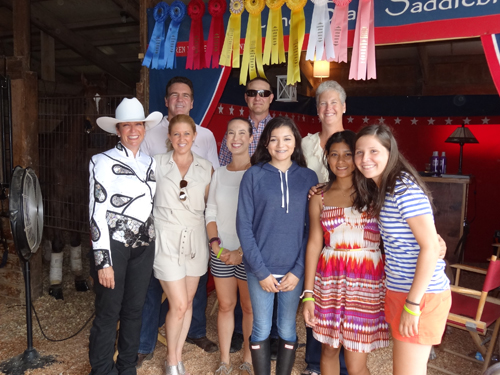
Another hallmark of Milo’s is an open mind; he is always willing to learn, and between the horses themselves and past trainers who were willing to impart their wisdom, he has been blessed with a number of excellent teachers.
“I think about every horse trainer in this business has been a parent to me,” Milo said. “They’ve basically raised me. I was a wild child, and I’m still pretty wild. They made it really tough for me to get to where I am now, and maybe that’s because I had to earn their respect. They wanted to make sure I was taking it seriously.”
Milo did take it seriously. He studied them, and took their advice to heart. One of the most useful bits of guidance came from trainer Bobby Gatlin.
“As you get better, you’ll do more with less,” Bobby once told him.
As promised, this concept has shaped Milo’s training philosophy more and more as the years have gone by. These days stretchies, shackles or any action devices other than the occasional pair of chains, are a rarity at Lone Star.
But Saddlebred trainers were not the only source of Milo’s knowledge; he has looked to broaden his knowledge outside of the rigidity of the Saddlebred industry as well.
“I went out to work with other breeds and realized there’s another way that these horses can be happy,” he said.
Because of this, Milo defies the status quo when it comes to some common Saddlebred practices; for example, all of his horses get turned out for two months in the winter.
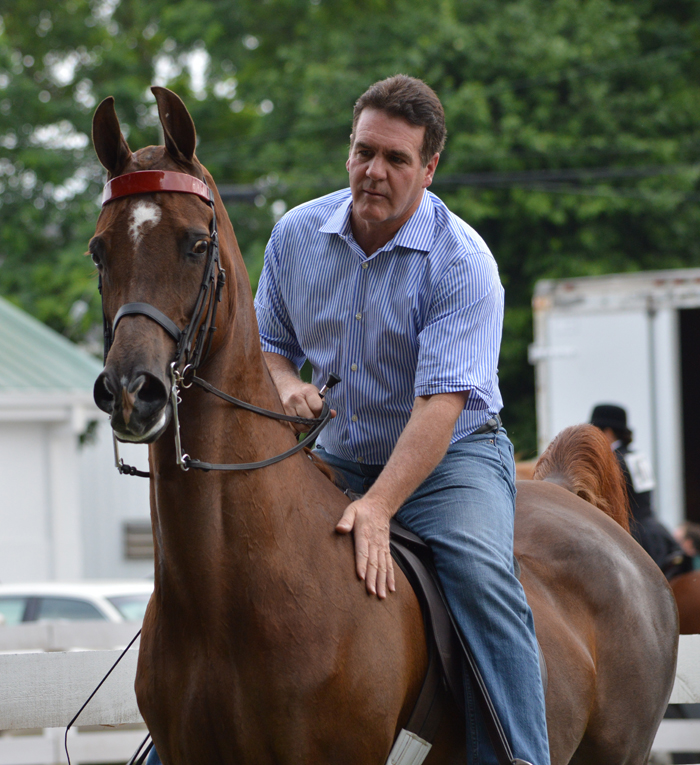
Sharon believes that this wide array of knowledge and Milo’s creativity in working with horses and riders is one of the reasons he produces such great results.
“He’ll use dressage techniques or Parelli techniques,” she said. “He is constantly reinventing. That’s why some of these horses that others have thrown away or given up on come rising through the ranks with him. He’s willing to try different things.”
But, of all Milo’s skills, perhaps the most important has been his ability to navigate an industry notorious for its rollercoaster ups and downs.
“In this business there are times when you’ll sit there and put your face in your hands and say, ‘I just can’t do this anymore,’” Milo said. “Maybe it’s a client, or a ribbon you thought you earned, but you learn to be very strong and to rely on your own skills. You ended up thanking those people because you find another level of yourself you didn’t know you had. They make you grow if you allow it. If you run to it – fight through it – you come out a stronger, better person.”
At those low times, it is Koren’s determination and encouragement and Milo’s profound respect for the horses that motivates him to push through.
“The horse has given us so much,” he said. “We would not have this country and we would not have our freedom if it wasn’t for them. They helped us win our independence from the British, and the Saddler specifically played a huge part in the Civil War. They have died for us. Even though there are horses that are tough, we owe them all a chance. We wouldn’t be doing this if it wasn’t for them.”
Milo speaks about the Saddlebred with an actor’s eloquence, but it’s not an act. He means every word.
“Saddlebreds are one of the few horses that will look you in the eye and tell you a story about themselves,” he said. “They may come to you abused, but they can become trusting again. There are ones who work hard and ones that work extremely hard for you. How many times do you get up in the morning and want to do your job? A Saddle Horse wakes up every morning and wants to do its job. Even if it’s wrong sometimes, at least they’re trying.”
Because of this belief, Milo tries to be an advocate for his horses, working with them to be successful and happy in their jobs so that they will be a good teammate in the future, wherever they land. However, Milo also keeps track of the horses that leave his farm, and has been known to welcome them back if they are ever in need of a new home.
“There is a true love there,” Koren said. “Training is not a path to a paycheck or a means to an end. The horse is in the center of his world and is the link to the fond memories of his family.”
Sharon believes it is this passion of Milo’s that creates an environment of excellence at Lone Star.
“You don’t normally find that in a barn,” she said. “I’ve been in a lot of barns in my years as a client and most are loosely run and not really tightly managed; it’s just not that way here. His expectations are very, very high and he holds those expectations for his horses, clients and employees.”
This is apparent in everything from the way Milo trains and interacts with the horses to the way he cares for them, making sure they have the best feed, supplements, farrier work and more.
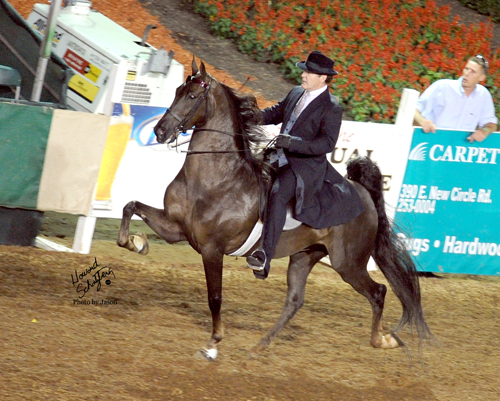
Sharon witnessed one of the best examples of this passion a few months ago, at Lone Star’s annual pre-show season clinic. Each year the clinic focuses on a different equine topic and this year it focused on the Join-Up method, made popular by natural horseman Monty Roberts. With Milo’s coaching, clients were given the chance to enter the round pen and try Join-Up with their horses. When it was Sharon’s daughter Jennifer’s turn, her horse, Callaway’s Essential, or “Oliver,” not only joined up, but actually got down and rolled.
Milo reacted with so much emotion that it carried to each and every member of the barn.
“He was so intense about that,” Sharon said. “It was a tearful, moving experience for everybody. That’s a passion that you can’t teach; you can’t possibly create that in your barn unless you feel it yourself.”
Milo always felt it. It’s why he gave up a motocross bike. It’s the reason he returned from California. And it is, ultimately, what led him to Lone Star.
“He decided to train professionally after realizing that this was the easiest and most rewarding of all the paths for him,” Koren said. “I tell him that the reason for that is because it was meant to be. Sometimes the path of least resistance is so for a reason.”
Koren believes that there is a certain fabric that makes up Milo’s life, and you don’t have to look too closely to see the stuff from which it is built. It’s the horses. And, in fact, it always was.



